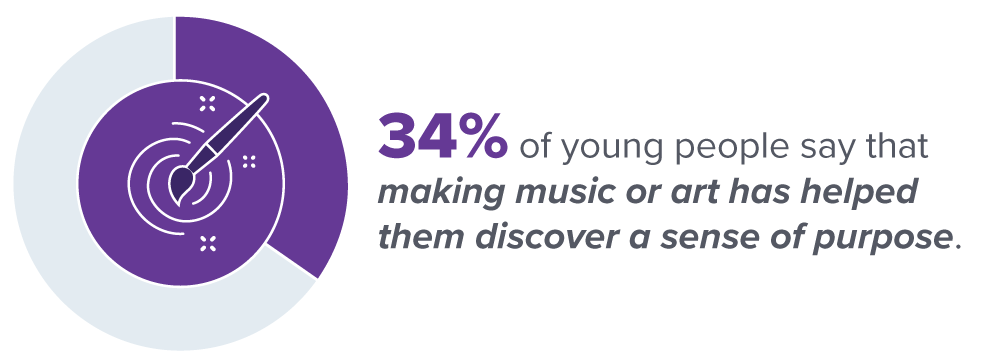
Two Paths to Facilitate Purpose: How Adults Can Help Young People Discover Theirs
"Well, for me personally, I think my purpose in life is to be able to resist and heal from the things that have affected me and just help others and live my life the way I deserve to - overcome the struggles and stuff…Maybe I understand why people would bring religion into purpose. They’d probably say… oh God brought them, gave me life because this is my purpose. And try to create that connect[ion]. That connection for me is more of like connecting to my highest self and connecting to that purpose…just being able to heal, enjoy my time and my journey and help others."
—Eva, 23
The State of Religion & Young People 2022: Mental Health – What Faith Leaders Need to Know focuses on what faith leaders and others who work directly with young people need to understand about how religion, spirituality and mental health intertwine. This year’s report offers a three-part approach for organizations to build mental-health friendly environments for young people: creating connection, aligning expectations, and helping to discover purpose.
Gen Z is sometimes called the “activist generation” for their collective concern for addressing the social issues of the day – purpose matters to them. We define purpose as a sense of connection with something or someone bigger than oneself, and that sense can take a variety of forms, depending on the tradition or the participant in it. For young people, this might be a hobby they’re passionate about, a community they’re involved with, a spiritual practice that grounds them, a belief in a divine source, or something else.
Though few young people turn to traditional institutional religion as a one-stop shop for their purpose seeking, several of the young people we surveyed say that their faith community played a pivotal role in that overall process. Religious and spiritual communities are an ideal domain for conversations about what it means to align with something greater, and religious and spiritual leaders are an excellent fit to help young people navigate the path to purpose. The discovery of one’s purpose can contribute positively to mental health, so engaging in this process is a way faith leaders can promote mental wellness for young people.
Here are two avenues faith leaders can explore for helping young people connect to their purpose:
- Holding space to process difficulties in life. Forty-three percent of young people tell us that experiencing trauma, hardship, or illness, either of their own or of someone they care about, has helped them discover a sense of purpose. Leaders who make space for young people to process this kind of hardship put themselves in a position to accompany young people as they find a sense of purpose. This doesn’t mean one has to become a mental health first responder, but it simply means making space for young people to address these concerns is a way to be present for the purpose discovery process.

- Creating ways for young people to engage in the arts. Thirty-four percent of young people say that making music or art has helped them discover a sense of purpose. Things like art, music, or even nature, in general, are powerful vehicles for helping connect us with something outside ourselves. In that sense, they are “religious” vehicles in themselves, fostering a sense of “something more” that can lead to conversations, questions, and curiosities at home within diverse religious traditions and rituals. Religious leaders need to think creatively about how to use the arts to engage young people, as it may help them begin to see religious and spiritual spaces as ones that encourage purpose seeking.
Young people have a deep desire for experiences of things like beauty, awe, wonder, goodness, calling, and love—things that might very well be called or connected to the divine. The pathway to purpose for religious organizations runs through these elements, by connecting God or divine or spirituality to experiences. Faith leaders can be a very important conduit in this path to purpose.
Read more about how to facilitate the discovery of purpose and other elements that can help adults better understand and connect with young people in this year’s State of Religion and Young People report.



